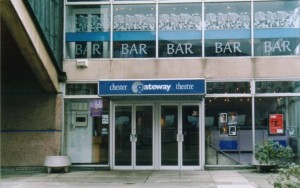Introduction
Many Groups staged displays and performances usually for parents and always as fundraisers. If other friends and relations went along then so much the better. These early shows helped to promote the Scouting ethic and to bind the ties with local community, especially in the village Groups. Plays, pantomimes and Music Hall style shows were put on by the 1st. Christleton and later the 4th. Chester to raise money towards their H.Q. building funds. The Records show that the 1st, 2nd, 3rd, 6th and 8th Chester Groups put on performances, sometimes known as ‘Parents’ Evenings’ to raise money to buy camping equipment or to help subsidise the cost of a camp. These shows were staged sometime before the first London Gang Show in 1932 and were therefore not of the Gang Show format. The leadership from Ralph Reader and the material he wrote and published prompted a new style of show, which was to come later.
In the 1950’s the 1st Christleton and 2nd Chester combined to put on shows in the Christleton H.Q. called Scout Pie. Some of the proceeds went towards the cost of sending boys to a forthcoming Jamboree in Canada. Christleton also put on Pantomimes, including Cinderella, Dick Whittington and Robinson Crusoe. These were sometimes in co-operation with the 35th or the 2nd Chester. Similar shows were put on by the 8th, 18th, and 35th Chester Groups.
In the 1960’s the 1st Tarporley under the leadership of the G.S.L. Richard Humble put on a show lasting for 3 nights as a fundraiser for their new H.Q. building fund. The programme was based on that of the Chester Gang Show, Scoutabout. This type of show was revived in 1975 by the S.L. Tim Enfield, combining it with an awards evening and the Group A.G.M. It was held in the High School Hall, which was always full to overflowing. This show is still put on (1997). The 25th Chester staged a similar show for the same reason in St. Paul’s Church Hall, Boughton in 1977.
Nutcracker
In 1938, the 8th and 13th. Chester Groups joined forces and put on a Gang Show style of performance for three nights at the College School, Parkgate Road. It was produced by Leslie Brooks, G.S.M. of the 13th, and called Nutcracker. It was a pilot show for a future District Gang Show but the threat of and then the outbreak of World War 2 scuppered these plans. The London Gang Show, devised, written and produced by Ralph Reader was revived in 1951, and a party of leaders from the 8th and 13th. Chester Groups went to see it. They were so inspired that they decided to stage a similar show, based on what they had seen. The combined strength of the two Groups provided a Gang of 112, plus all the necessary stewards and stage staff, (without involving the Cubs). Rehearsals held in the College School hall started in 1952. The subsequent show (of three performances) was staged in the Cathedral Refectory on January 16th and 17th 1953. The proceeds went to the King George VI Memorial Fund. It was so successful, that the 1st. Upton we’re invited to add their numbers to those of the 8th, and 13th, and the next show in 1954 ran for 5 nights. It was this year that well-known local musicians, Billy Brickland along with his orchestra were invited to provide the musical accompaniment, replacing the two pianos of the previous year.
We move to the Royalty Theatre
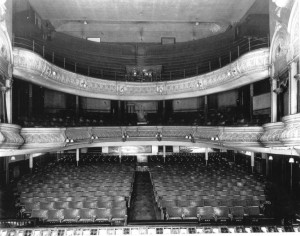 The success of this third show was such that the District took over responsibility. It was decided to involve all the Groups in Chester and District, take a big chance, and hire the Royalty Theatre in City Road. This was done, and the first truly District Gang Show, ‘Scoutabout 1956’, was staged with a Gang of 128 on 10th December. It ran for one week. Eighteen of the Gang were Cubs who for the first time had their own item which was produced by the A.D.C. (Cubs) Miss H.M. Smith.
The success of this third show was such that the District took over responsibility. It was decided to involve all the Groups in Chester and District, take a big chance, and hire the Royalty Theatre in City Road. This was done, and the first truly District Gang Show, ‘Scoutabout 1956’, was staged with a Gang of 128 on 10th December. It ran for one week. Eighteen of the Gang were Cubs who for the first time had their own item which was produced by the A.D.C. (Cubs) Miss H.M. Smith.
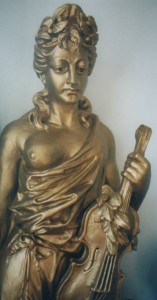 There was no show in 1957, as the interior of the Royalty Theatre was being refurbished. We returned in 1958 and the Royalty became the home of Scoutabout for the next 8 years. The show was always staged during the last full week in the year prior to the Christmas Pantomime, which opened on Boxing Day. The theatre was used during the day for the Panto rehearsals and in the evening for the Gang Show performances, so the Gang had to put up with the Panto scenery as well as their own! We received a great deal of help from the theatre, the owner, Aldennan Keyes, and especially from the Theatre manager, Mr. Dennis Critchley. Many of the stars involved in the pantomimes took an active interest in the show and gave it their support. Despite all the efforts of the management, economics forced the closure of the Royalty Theatre in 1966. The Scoutabout Committee along with other amateur theatrical societies were force to look for a new home.
There was no show in 1957, as the interior of the Royalty Theatre was being refurbished. We returned in 1958 and the Royalty became the home of Scoutabout for the next 8 years. The show was always staged during the last full week in the year prior to the Christmas Pantomime, which opened on Boxing Day. The theatre was used during the day for the Panto rehearsals and in the evening for the Gang Show performances, so the Gang had to put up with the Panto scenery as well as their own! We received a great deal of help from the theatre, the owner, Aldennan Keyes, and especially from the Theatre manager, Mr. Dennis Critchley. Many of the stars involved in the pantomimes took an active interest in the show and gave it their support. Despite all the efforts of the management, economics forced the closure of the Royalty Theatre in 1966. The Scoutabout Committee along with other amateur theatrical societies were force to look for a new home.
A New Home
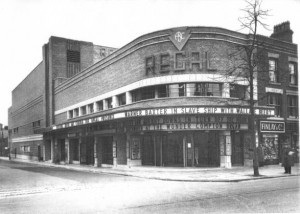 This was found at the A.B.C. Regal Cinema in Foregate Street. Hiring the cinema set a number of new challenges that had to be considered very carefully. The rental was much higher, the auditorium of 2000 seats was twice the capacity of the Royalty, the stage was 45′ wide but only 14′ deep. There was no fly gallery and only one backcloth rail, amplification was a problem and there was very little dressing room accommodation. Hiring Love Street Girls S.M School on the opposite side of the road from the cinema solved the dressing room space.
This was found at the A.B.C. Regal Cinema in Foregate Street. Hiring the cinema set a number of new challenges that had to be considered very carefully. The rental was much higher, the auditorium of 2000 seats was twice the capacity of the Royalty, the stage was 45′ wide but only 14′ deep. There was no fly gallery and only one backcloth rail, amplification was a problem and there was very little dressing room accommodation. Hiring Love Street Girls S.M School on the opposite side of the road from the cinema solved the dressing room space.
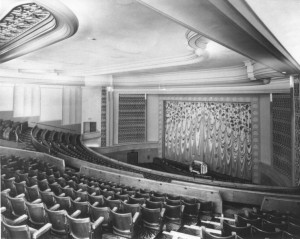 The last two years at the Royalty had been ‘sell outs’, so it was thought that a chance could be taken to fill the cinema for performances over the first week in the New Year, especially as there was no Panto production. The ingenuity of the stage staff led by Brian Whiting from Coventry, solved the staging problems. The the show was put on; the Dress Rehearsal being held on Monday 1st January and the performances ran from Tuesday 2nd for five nights. It was a successful week, so it was decided to hire the cinema for the corresponding week in 1968. However, ticket sales were poor, and for the first time the show lost money. This was to the tune of £300, which in these days was a great deal of money. The loss was due in part to the fact that the Chester Gateway Theatre had just opened and the Sound of Music was playing at, and filling the Odeon. To make things worse, there was also a severe ‘flu epidemic and Foot and Mouth had broken out on farms in the County. The Scoutabout Committee gave the show its full support and decided that if a new suitable venue could be found,then the show should continue. It was felt that we could not return to the Regal Cinema as this was was considered to be too big a commercial risk. A small committee consisting of Eric France, Bill Capstick, Bill Brickland, Fred Parker (Stage Manager) and Roy Fisher (Producer) looked at a number of school and church halls, including Chester College and the College of Further Education.
The last two years at the Royalty had been ‘sell outs’, so it was thought that a chance could be taken to fill the cinema for performances over the first week in the New Year, especially as there was no Panto production. The ingenuity of the stage staff led by Brian Whiting from Coventry, solved the staging problems. The the show was put on; the Dress Rehearsal being held on Monday 1st January and the performances ran from Tuesday 2nd for five nights. It was a successful week, so it was decided to hire the cinema for the corresponding week in 1968. However, ticket sales were poor, and for the first time the show lost money. This was to the tune of £300, which in these days was a great deal of money. The loss was due in part to the fact that the Chester Gateway Theatre had just opened and the Sound of Music was playing at, and filling the Odeon. To make things worse, there was also a severe ‘flu epidemic and Foot and Mouth had broken out on farms in the County. The Scoutabout Committee gave the show its full support and decided that if a new suitable venue could be found,then the show should continue. It was felt that we could not return to the Regal Cinema as this was was considered to be too big a commercial risk. A small committee consisting of Eric France, Bill Capstick, Bill Brickland, Fred Parker (Stage Manager) and Roy Fisher (Producer) looked at a number of school and church halls, including Chester College and the College of Further Education.
The Move to the Chester Gateway Theatre
In 1968, ticket sales were poor, and for the first time the show lost money. This was to the tune of £300, which in these days was a great deal of money. The loss was due in part to the fact that the Gateway Theatre had just opened, the Sound of Music was playing at, and filling the Odeon, there was a severe ‘flu epidemic and Foot and Mouth had broken out on farms in the County. The Scoutabout Committee gave the show its full support and decided that if a new venue could be found and was considered suitable, then the show should continue, but not at the Regal Cinema which was considered to be too big a risk. A small committee consisting of Eric France, Bill Capstick, Bill Brickland, Fred Parker (Stage Manager) and Roy Fisher (Producer) looked at a number of school and church halls, Chester College and the College of FE. The facilities at the Gateway Theatre, and the support and encouragement offered by the Theatre Director, Julian Oldfield and his staff was more than enough to convince the committee and the Gateway Theatre was booked. Rehearsals started in the autumn of 1968 for a production in 1969. This year was also a landmark in that for the first time, following the example set by Ralph Reader and the London Gang Show, there were girls in the Gang – all 12 of them. They were all warranted Cub Leaders. Two shows were produced in 1971, one in January and a second in December. Once again Scoutabout was staged at the end of December, with the Gateway Christmas Show opening on Boxing Day. This arrangement continued until 1988 when the Theatre, along with so many others opened their Christmas run at the beginning of December. Since that year the show has been staged whenever the theatre was available, – in January, February, March, or April but always following the Christmas Show.
At this time, most of the material had originated from Ralph Reader, but after his death in 1982 that supply of material was cut off. However, we had always used additional sketches from Wilcock & Rutherford, Jim Foote (well known in Gang Show circles) & other Gang Shows, so we were able to cope.
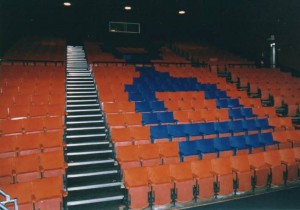 The Producers
The Producers
The first four shows, three at the Cathedral Refectory and one at the Royalty Theatre were produced by Leslie Brooks and his team of Fred Cowley, Jim Rocke, John Gittins and Roy Fisher. From 1958 the team led by Roy Fisher, consisted of Colin Cresswell, Les Phillips, Ernie Boyer, Eric Wilson, and Geoff Taylor. In 1979 Roy Fisher, our Producer since 1958 semi-retired & in 1980, the role of Executive Producer was taken over by Keith Musselle, who had previously been Gang Organiser. His team consisted of Derek Jackson, Eric Wilson, and Roy Fisher and it produced shows up to and including that for 1986. Keith and Derek then retired and from 1987 Roy Fisher returned, assisted by Eric Wilson and Eric Plenderleath to again produce the show. In 1991 the team was augmented by Richard Clarke and George Marshall and in 1992 by Alison Hough and Matthew Davies who contributed youthful and more modern ideas. Lesley Pritchard and Diane Woods assisted with the production of the Cub Scout item. In 1995 Roy finally retired as producer so Matthew Davies took over as Executive Producer, adding to his team Louise Roffey who had previously been rehearsal pianist, Richard Clarke and Alison Horne as Assistant Producers.
Following a series of very successful shows, we were finally awarded the Gang Show ‘Red Scarf’ by the HQ National Assessors in 2001 (Producer Matthew Davies) but sadly, Roy Fisher our Producer of 36 shows died shortly after in 2002.
On a happier note, in 2004 we celebrated our Golden Jubilee, to be followed by a later production in 2007 (both shows produced by Richard Clarke), the latter show coinciding with the 75th Anniversary of the first London Gang Show in 1932. The Gateway Theatre then closed & we were once more searching for a new venue &, (as it transpired), a new Producer. “Cometh the hour, cometh the man”, (to coin a phrase) & Keith Harding stepped into the breach as we moved on to The King’s School.
The Musicians
 Dick Jones (Organist of the Northgate Congregational Church) and Robert Lewis (A Teacher at Newton Council School) provided the music for the first show in 1953 on two pianos. In 1954, Bill Brickland, a well-known Cestrian and Dance Band leader, was recruited to orchestrate the show and provide all the backing with his eight piece band. He continued in this capacity as Musical Director for the next 26 years until his final show in 1979. In 1965 he was recruited by Coventry to be their M.D. and this in turn led to involvement in other Gang Shows in the Midlands. He was awarded the Medal of Merit for his endless support and help. Due to ill health he retired from the Gang Show scene in1979 and Colin Parfitt donned the mantle of Musical Director for the 1980 production. He has continued in that position to the present day giving the Gang Show the same high standard of help and support. During this time Colin was Head of Music at Blacon High School, and often allowed some of his pupils to augment the orchestra. Initially, Colin volunteered to be a temporary stand-in but by the end of this production (in 2018) he will have been MD for 35 shows.
Dick Jones (Organist of the Northgate Congregational Church) and Robert Lewis (A Teacher at Newton Council School) provided the music for the first show in 1953 on two pianos. In 1954, Bill Brickland, a well-known Cestrian and Dance Band leader, was recruited to orchestrate the show and provide all the backing with his eight piece band. He continued in this capacity as Musical Director for the next 26 years until his final show in 1979. In 1965 he was recruited by Coventry to be their M.D. and this in turn led to involvement in other Gang Shows in the Midlands. He was awarded the Medal of Merit for his endless support and help. Due to ill health he retired from the Gang Show scene in1979 and Colin Parfitt donned the mantle of Musical Director for the 1980 production. He has continued in that position to the present day giving the Gang Show the same high standard of help and support. During this time Colin was Head of Music at Blacon High School, and often allowed some of his pupils to augment the orchestra. Initially, Colin volunteered to be a temporary stand-in but by the end of this production (in 2018) he will have been MD for 35 shows.
Chester Gang Show Members Perform in London
In 1992, a special one off Gang Show entitled the “Gang’s all Here,” was produced and staged at the Wimbledon Theatre, London. All the cast was composed of performers from the many other provincial Gang Shows. The show was put on to commemorate the 60th Anniversary of the first London Gang Show and as a tribute to the late Ralph Reader. Alison Hough, Helen Withington, Matthew Davies and Andrew Harrop represented Chester. They all performed with professionalism and were a credit to Chester. Alison Hough was the only Scout member of the Gang to sing a solo, as the video will testify.
Supported by Celebrities
Throughout the years, Scoutabout received a great deal of support and encouragement. Those from the professional theatre included – Ifor Emmanuel, Billy Dainty, Gladys Morgan, Mickey and Griff, Russ Abbott, Syd Lawrence, Keith Harris, Charlie Chester, Ronnie Barker, Ken Dodd, Dame Thora Hurd, Roy Hudd, Matthew Kelly, Michael Le Vell, and Philip Schofield. The Mayor of Chester (later to be the Lord Mayor) has attended every production with the exception of those when he/she was represented by the Sheriff. Other guests have included the Dukes and Duchesses of Westminster, Lord and Lady Leverhulme, Lord Rochester, The Chief Scout, Sir William Gladstone and Lady Gladstone and Chester’s M.P.s Jack Temple, Peter Morrison, Gyles Brandreth, Christine Russell, Stephen Mosley & Chris Matheson. Every County Commissioner and Field Commissioner attended at least one performance during their tenure of office. A significant point is that Eric Plenderleath who has been a member of the Gang of Scoutabout and was for many years the Gang Organiser, attended the performance in the Millennium year in his capacity as the Lord Mayor of Chester
Supported by Business
The production has always received support over the years from many businesses, both local and national, as sponsors or advertisers in the Gang Show Programmes. However, the financial risks had always been underwritten by Chester & District Scout Council, but after the 1995 show it was proposed by the then District Chairman Terry Collier that a formal business plan in support of the budget, would assist in mitigating the risk.
As a result, a business committee, operating in parallel with the production team was set up in 1996. The Chairman was David Lloyd, the Secretary Janet Bull & Treasurer Ron Jackson plus others responsible for Publicity, Sponsorship & Bookings. Within a few months of operation the committee requested sponsorship from Marks & Spencer Financial Services, which had then been recently located in the Business Park a few hundred yards away from King’s School. Their response was both rapid, magnanimous & beyond our highest expectation. We received a lump sum in cash which eradicated a deficit on the previous show, leaving a balance to support the next. In addition, their in- house design team produced a layout & template for the programme which has stood the test of time & is still currently used. Prior to this support, until their shops closed, C.C Bounds & T.C. Burrells put an advert in every programme over 40 years, a generous precedent which has been subsequently followed by others, plus donations made via our Gang Show Patrons initiative. Also, in 2004 W. H. Evans (Printers) who had produced all our printed material since 1953, paid for a facsimile of the original 1953 programme to be made & inserted into the 2004 show Golden Jubilee Souvenir Programme.
By 1999 the Business Committee was fully operational & making a very significant contribution to keeping the show on the road. The members by then were, Chairman Gerald Roose, Vice Chairman David Lloyd, Treasurer, Ron Jackson, Secretary Pam Jones plus others including Alison Johnson, Dave King, Eric Plenderleath & Angela James. With the inevitable adjustments of responsibilities & some retirements, this team has essentially remained little changed until very recently.
The 60th Anniversary show in 2016 was one of our very best performances, as might be expected, but it came as a watershed for some veterans on the business committee to move out of the front line & into less demanding roles in the hierarchy. Many of these, some at or over 80 years old, had worked hard to keep the ship afloat for a very long time. Ged Roose, the Chairman has retired & taken on some of the more peripatetic tasks, Ron Jackson (Treasurer since 1996) has stood down, as has Pam Jones (Secretary) & Peter Slater (Assisting Front of House), but June Hughes, our long serving procurer of programme adverts still remains. The new Business Chair is Alex Davies supported by Eric Plenderleath, (Treasurer & Vice-Chairman), plus Jonathan Ducker (Manager F.O.H). The new membership, in detail, is set out in the most recent show programme.
From its earliest days, this Committee has been very successful in guaranteeing the financial viability of our show as we move ever onward into more sophisticated & technically complex productions.
Did you know…?
In 1962 Norman Couch, a colleague of David King, made an 8mm film of that year’s production of Scoutabout. It started with the first production meetings in the spring and then covering rehearsals, auditions, costume making, scenery building and stage make-up, through the autumn until to the week of the show in December. Scenes of parts of different items in the programme were filmed at the Dress Rehearsal, showing some of the problems which had to be overcome. Also, the activity, front of house, on stage and back stage during one of the performances was recorded. Norman entered the film, which had a soundtrack (quite something for 8mm in those early days) in a National competition and gained the third prize. Come the era of television and video, the film was transferred on to videotape. To the best of our knowledge it is the only film and video which shows the Royalty Theatre when it was a live working theatre. A copy of the video is now in the Chester City Archives and on Youtube here and here.
In Conclusion
Things are now much more sophisticated, but just being involved in the twilight years of the 1950s Music Hall has been an experience never to be forgotten. Our early days were the pioneering days: Smoke was generated with hot water and huge lumps of dry ice. Thick fog rolled down stage, filling the orchestra pit to the top of the music stands. The band played on, blind and struggling to avoid suffocation. Peter Pan could fly using a £25 per week hired harness. The warning on take-off was simply to, “Watch out for enemy night fighters when approaching the ceiling.” Having lived through it all, I can only say to anyone out there who might be interested, “Come and join us”. Last but not least, “All the Best of Luck to the Gang and supporting Team, you deserve it!”
Early Original Text & Material by Roy Fisher
Later Additions & Revisions by Gerald Roose
January 2018
